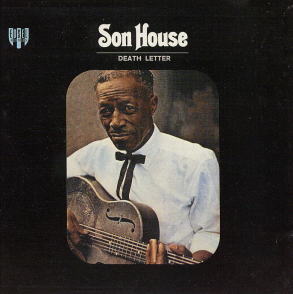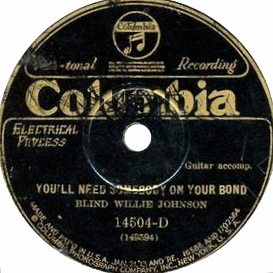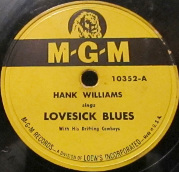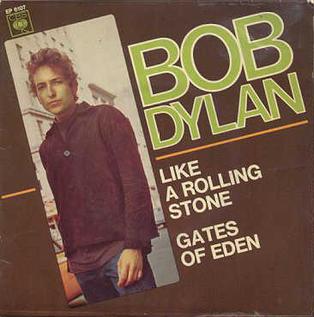
Blind Willie McTell was a Piedmont blues and ragtime singer and guitarist. He played with a fluid, syncopated fingerstyle guitar technique, common among many exponents of Piedmont blues. Unlike his contemporaries, he came to use twelve-string guitars exclusively. McTell was also an adept slide guitarist, unusual among ragtime bluesmen. His vocal style, a smooth and often laid-back tenor, differed greatly from many of the harsher voices of Delta bluesmen such as Charley Patton. McTell performed in various musical styles, including blues, ragtime, religious music and hokum.
"St. James Infirmary Blues" is an American blues song of uncertain origin. Louis Armstrong made the song famous in his 1928 recording on which Don Redman was credited as composer; later releases gave the name Joe Primrose, a pseudonym of Irving Mills. The melody is 8 bars long, unlike songs in the classic blues genre, where there are 12 bars. It is in a minor key, and has a 4
4 time signature, but has also been played in 3
4.

"Blind Willie McTell" is a song written and performed by American singer-songwriter Bob Dylan. Named for the blues singer of the same name, the song was recorded in the spring of 1983, during the sessions for Dylan's album Infidels; however, it was ultimately left off the album and did not receive an official release until 1991, when it appeared on The Bootleg Series Volumes 1–3 1961–1991. It was also later anthologized on Dylan (2007).

Infidels is the 22nd studio album by American singer-songwriter Bob Dylan, released on October 27, 1983 by Columbia Records.
"Love in Vain" is a blues song written by American musician Robert Johnson. He sings of unrequited love, using a departing train as a metaphor for his loss. Johnson's performance – vocal accompanied by his finger-style acoustic guitar playing – has been described as "devastatingly bleak". He recorded the song in 1937 during his last recording session and in 1939 it was issued as the last of his original 78 rpm records.

"Death Letter", also known as "Death Letter Blues", is the signature song of the Delta blues musician Son House. It is structured upon House's earlier recording "My Black Mama, Part 2" from 1930. House's 1965 performance was on a metal-bodied National resonator guitar using a copper slide.

"You'll Need Somebody on Your Bond" is a gospel song that is attributed to both tradition and to gospel blues musician Blind Willie Johnson. Johnson first recorded the song in December 1930, although Delta blues musician Charley Patton recorded a similar "You're Gonna Need Somebody When You Die" in October 1929. Over the years, several other musicians have recorded renditions of the song.

"Highway 61 Revisited" is the title track of Bob Dylan's 1965 album Highway 61 Revisited. It was also released as the B-side to the single "Can You Please Crawl Out Your Window?" later the same year. In 2004, Rolling Stone magazine ranked the song as number 364 in their 500 Greatest Songs of All Time.

"Different Drum" is a song written by American singer-songwriter Michael Nesmith in 1964. It was first recorded by the northern bluegrass band The Greenbriar Boys and included on their 1966 album Better Late than Never!. Nesmith offered it to the Monkees, but the producers of the TV show, who had wide control over the group's musical output early on, turned him down.

"Lovesick Blues" is a show tune written by Cliff Friend and Irving Mills. The song first appeared in the 1922 musical Oh, Ernest. It was first recorded by Elsie Clark and then by Jack Shea. Emmett Miller recorded it in 1925 and 1928, followed by country music singer Rex Griffin circa 1938. The recordings by Griffin and Miller inspired Hank Williams to perform the song during his first appearances on the Louisiana Hayride radio show in 1948. Receiving an enthusiastic reception from the audience, Williams decided to record his own version despite initial push back from his producer Fred Rose and his band.
Kate McTell was an American blues musician and nurse from Jefferson County, Georgia. She is known primarily as the former wife of the blues musician Blind Willie McTell, whom she accompanied vocally on several recordings. She may have recorded as Ruby Glaze, but there is some uncertainty about whether she and Glaze were the same person, despite the fact that she claimed to be Glaze.
"I Shot Ya / I Shot Ya (remix)" is a song by American rapper LL Cool J featuring Keith Murray, from his sixth album Mr. Smith. The remix version of the song was released as a B-side to "Hey Lover", but received a video directed by Hype Williams, leading some to believe the track was an actual single from the album. Produced by Trackmasters, the remix was released in 1995 for Def Jam Recordings, and peaked at number 55 on the Hot R&B/Hip-Hop Songs for the Billboard charts.

"John the Revelator" is a traditional gospel blues call and response song. Music critic Thomas Ward describes it as "one of the most powerful songs in all of pre-war acoustic music ... [which] has been hugely influential to blues performers". American gospel-blues musician Blind Willie Johnson recorded "John the Revelator" in 1930 and subsequently a variety of artists have recorded their renditions of the song, often with variations in the verses and music.

"Gates of Eden" is a song by Bob Dylan that appears on his fifth studio album Bringing It All Back Home, released on March 22, 1965 by Columbia Records. It was also released as a single as the B-side of "Like a Rolling Stone". Dylan plays the song solo, accompanying himself on acoustic guitar and harmonica. It is considered one of Dylan's most surreal songs. In a 2005 Mojo magazine poll of its writers and various well-known musicians, "Gates of Eden" was ranked 76th among Dylan's 100 greatest songs.

"It's Nobody's Fault but Mine" or "Nobody's Fault but Mine" is a song first recorded by gospel blues artist Blind Willie Johnson in 1927. It is a solo performance with Johnson singing and playing slide guitar. The song has been interpreted and recorded by numerous musicians in a variety of styles, including Led Zeppelin on their 1976 album Presence.
"Boll Weevil" is a traditional blues song, also known by similar titles such as "Boweavil" or "Boll Weevil Blues". Many songs about the boll weevil were recorded by blues musicians during the 1920s through the 1940s. However, a rendition by Lead Belly recorded in 1934 by folklorist Alan Lomax led to its becoming well-known. A 1961 adaptation by Brook Benton became a pop hit, reaching number two on the Billboard Hot 100.
"Ball and Biscuit" is the eighth track on the album Elephant by American alternative rock band The White Stripes.

"Take Your Stand" is a gospel blues song recorded in 1929 by Blind Willie Johnson and Willie B. Harris (vocals), who is thought to have been his first wife. Johnson sings throughout in his "growl" voice. The lyrics and melody are similar to that of Charley Patton's "Prayer of Death Pt. 1" recorded earlier in 1929. The composer is unknown; the song may be traditional.

Fred McMullen was an American blues singer and guitarist known to be active in the 1930s. He recorded with the guitarists Curley Weaver and Buddy Moss in 1933, after which there is no definitive documentation of his life or whereabouts.












